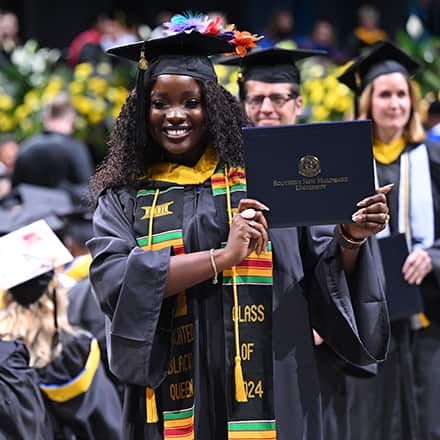Campus Celebrates Successes, Builds Connections at Year-End Conference

After classes ended and finals were graded, Southern New Hampshire University (SNHU) faculty and staff on the Manchester, New Hampshire, campus gathered for Closure '22 to reflect on the semester and look toward the next one. Hosted by the Center of Teaching and Learning (CTL) at SNHU, the annual conference seeks to create learning opportunities through keynote presentations, breakout sessions, affinity luncheons and more.
 “Traditionally, Closure has been a time for the SNHU campus to come together at the end of the semester (to) celebrate things that have gone well, learn from things that could have gone better and also learn from external industry professionals and from each other,” said David Humphreys, CTL director and assistant professor of communication.
“Traditionally, Closure has been a time for the SNHU campus to come together at the end of the semester (to) celebrate things that have gone well, learn from things that could have gone better and also learn from external industry professionals and from each other,” said David Humphreys, CTL director and assistant professor of communication.
The theme of this year’s event was (re)Building Community, which felt especially important after some time of global and institutional change.
“We still care about our learners, we still want to do the best we can at our jobs and we still want to see our colleagues succeed – and we're good at doing all of that,” Humphreys said. "But I think that we need to take time and energy and put effort into figuring out who we are now.”
 Closure's theme celebrated the repopulation of campus during the 2021-2022 school year and acknowledged all its staff and faculty can still do to foster positive relationships among colleagues and students.
Closure's theme celebrated the repopulation of campus during the 2021-2022 school year and acknowledged all its staff and faculty can still do to foster positive relationships among colleagues and students.
After a disruptive couple of years, one of the conference speakers shared with attendees that "resilience" is not a trait. Dr. Sara Truebridge, an adjunct for SNHU’s educational leadership doctoral program and a Closure presenter, is a resiliency researcher who believes faculty and staff can help their students be resilient. “Resilience begins with beliefs," she said. "It’s believing that every student has resilience and the capacity for resilience."
Learning from Global and Local Professionals
Many of the Closure ’22 session presenters were members of the SNHU community who had a particular area of expertise or interest relating to community building.
Much like the goal of many sessions, the conference organizers leveraged existing relationships and forged new ones to piece together the extensive itinerary of options. “We are a community, and we all bring different things to the table,” Humphreys said. “And a lot of Closure has been designed and developed through these relationships."
Some of the in-person and hybrid sessions included:
- “Lessons Learned About Campus Students Over the Last Two Years” led by Vice President of Student Affairs and Campus-Based Initiatives Dr. Heather Lorenz and Dean of Students Dr. Meagan Sage
- “Making Room for Every Learner: The Art of Designing Stackable Credentials” led by Assistant Vice President of Strategy, Architecture and Performance Dr. Anat Eshed
- “Peer Connections: Helping Students Learn Social Skills” led by Senior Counselor of Wellness Dr. Traci Belanger and Associate Professor of Computer Information Systems Dr. Liz Henley
- “Supporting Students with Chosen/Preferred Names” led by Senior Director of Inclusive Learner Engagement Kayla Page
- “Virtual International Exchange Workshop” led by Director of International Experiences and Programs Ally Snell and Associate Dean of the School of International Engagement Dr. Darbi Roberts
Some sessions introduced resources relating to partnerships, experiential learning, student assistance programs and more available for faculty and staff to draw on in their work.
HelpU, for example, is a program offering students free and confidential counseling and coaching services 24/7. One session, led by Senior Director of Student Involvement Jay Tifone and Assistant Director of Counseling Services Elyse Peredna, explored the program and taught faculty and staff how they can share its uses and benefits with students.
A couple of other sessions led by Beth Sheehan, a professor of sport management, focused on how faculty can embed experiential learning options in their classes with the help of offices and other resources at the university.
Other professionals who have devoted their careers to building and sustaining relationships within the workplace or classroom led several sessions throughout Closure ’22.
They included:
- Dr. Peter Felten, the author of “Relationship-Rich Education: How Human Connections Drive Success in College” and executive director for a university center focused on engaged learning
- Dr. Kate Hammel, a recent SNHU doctoral program graduate and fourth-grade teacher whose dissertation focused on compassion fatigue in educators
- Dr. Marián de la Morena Taboada and Javier Antoranz Rivero, who run a Madrid wellness center that brings mindfulness practices into the workplace
- Dr. Sara Truebridge, a resiliency researcher, thought leader and founder of a social enterprise dedicated to increasing education and success in life
 Morena Taboada and Antoranz Rivero hosted several mindfulness workshops over the course of Closure that discussed the basics of what mindfulness is and how to sustain it at work. “Mindfulness is much more than this idea of meditation most people associate it to," Morena Taboada said. One of their sessions shared how faculty can create a well-being toolkit featuring sensory exercises and humor, for example, that can be applied to the classroom.
Morena Taboada and Antoranz Rivero hosted several mindfulness workshops over the course of Closure that discussed the basics of what mindfulness is and how to sustain it at work. “Mindfulness is much more than this idea of meditation most people associate it to," Morena Taboada said. One of their sessions shared how faculty can create a well-being toolkit featuring sensory exercises and humor, for example, that can be applied to the classroom.
Growing Relationship Building Skills Through Examples
Closure ’22 spanned from late April to early May, featuring more than 50 personal and professional development options for campus faculty and staff to come together in person. Some hybrid options were available so colleagues university-wide could join from anywhere.
"I think most people will find at least a few sessions that relate directly to the work that they're doing on a daily basis,” Humphreys said.
 After several days of gathering to learn from each other, Humphreys hopes Closure ’22 attendees left the conference feeling connected to their colleagues and energized as they head into the summer and begin preparing for the fall. “On an individual level and on a community level and on an institutional level, we do a lot of really great things,” he said. “And I think that there is certainly more that we can do for each other (and) for our learners.”
After several days of gathering to learn from each other, Humphreys hopes Closure ’22 attendees left the conference feeling connected to their colleagues and energized as they head into the summer and begin preparing for the fall. “On an individual level and on a community level and on an institutional level, we do a lot of really great things,” he said. “And I think that there is certainly more that we can do for each other (and) for our learners.”
If faculty and staff took just one thing away from keynote speaker Felten's presentation, he wants it to be how impactful simple practices such as calling students by their name, praising them and encouraging them can be. "I hope it’s that small acts of connection, caring, challenge (and) support can be really transformational for students," he said.
Online. On campus. Choose your program from 200+ SNHU degrees that can take you where you want to go.
Rebecca LeBoeuf ’18 is a writer at Southern New Hampshire University. Connect with her on LinkedIn.
Explore more content like this article

What is International Women's Day?

What Are New Year's Resolutions and Do They Work?

Legacies in the Making: Celebrating SNHU’s Class of 2024 at Commencement
About Southern New Hampshire University

SNHU is a nonprofit, accredited university with a mission to make high-quality education more accessible and affordable for everyone.
Founded in 1932, and online since 1995, we’ve helped countless students reach their goals with flexible, career-focused programs. Our 300-acre campus in Manchester, NH is home to over 3,000 students, and we serve over 135,000 students online. Visit our about SNHU page to learn more about our mission, accreditations, leadership team, national recognitions and awards.

